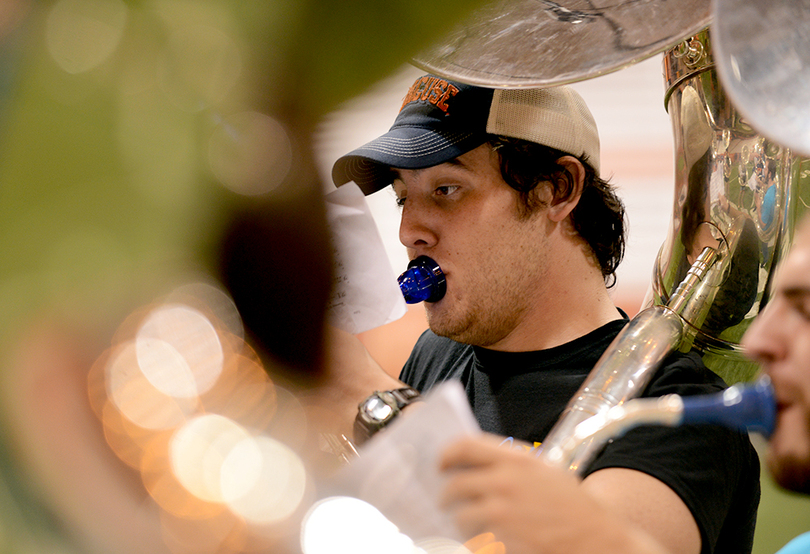With the band: Students get chance to strike up some tunes for marching band class
Pulp
Editor’s note: This story is the first in a series appearing occasionally that is intended to give readers a glimpse into distinct courses available at Syracuse University and the State University of New York College of Environmental Science and Forestry.
The Syracuse University Marching Band is not your typical band.
This band warmed up Monday night in Korean pop-style with Korean musician Psy’s “Gangnam Style.”
“Sometimes in warm-ups, we’ll do anything that the kids will get a kick out of,” said Justin Mertz, assistant director of bands and director of the SU Marching Band. “We did what we normally do — we just gave them something different to hear.”
And this marching band doesn’t just play at football games — it’s a “university band.”
“Our job is to make the campus a better and more fun place to be,” Mertz said.
With nearly 200 students enrolled in ENI 010: “Large Bands,” it takes up to three hours to prepare for the two-hour practice, which takes place on Monday, Wednesday and Thursday nights. The band also meets on Fridays and Saturdays if there is a weekend performance.
The band plays at anywhere from six to eight home games a year, along with 10 to 15 extra performances such as professional football games, exhibitions at high schools and marching band competitions. The band played Sept. 13 at the event celebrating SU reaching its $1 billion fundraising goal.
After the warm-up, the band breaks up into individual sections in which leaders go over that section’s part. The sections then regroup as a band and practice whatever songs they have to perform. They conclude with practicing formations.
“It’s usually pretty evenly split between practicing the music and either learning or reviewing on the field, so that’s us marching around,” said Jordan Campo, section leader for the alto saxophone players.
Band members said the marching band brings people together and provides a sense of community.
“It has a huge social effect on you,” said Campo, a senior policy studies major. “I’m in the band sorority, so not only do I have friends, but I also have sisters and brothers.”
Nicholas Valinski, a senior civil engineering and public affairs major, who is the drumline section leader, said that serving as a section leader is a way to give back to the band. It’s a natural progression, he said, from being a band member to becoming a section leader.
There are moments in which the band kicks back and enjoys a few laughs. At one of their football game performances, Mertz said, members of the percussion section reenacted a scene from the 1975 British comedy, “Monty Python and the Holy Grail,” in which the characters mimic a horse moving by clicking coconut shells together.
When members first start playing at the football games, they struggle to figure out the right speed at which to play. Valinski said that during the first couple of games, the players play faster than they are supposed to because of either excitement or nervousness.
Although Mertz is an SU alumnus, he described his first day teaching the class eight years ago as both “exciting and a little terrifying.”
“It was exciting because I’m the director of the marching band at my alma mater,” he said. “The first day was also a little terrifying because there were 200 students who were looking to me to give them an efficient, positive and constructive experience.”
Students juggle the long hours of practice with schoolwork and other activities. The biggest challenge, Mertz said, is keeping students focused amid their tough schedules.
Valinski said the demanding hours help him manage his time better.
“It is time-consuming, but the fact that it is taking up so much of your time means that you have to manage the rest of your time better,” he said.
Band members are typically hard on themselves if they do not produce their best work, said Patrick Garcia, a sophomore music education major and the band’s drum major, but the desire to perfect the craft is what motivates them.
Valinski said that he has had to figure out how to strike a balance between “being too passive and too aggressive.”
“So it’s not necessarily that my opinion is right, but that you can see everyone’s opinions and say, ‘OK, this is good for this,’ or ‘OK, this is good for that,’” he said.
When the different sections come together as a whole band, there is the question of ensuring that all the parts are heard at the right moments. The composers assign the players with specific numbers and letters so they can play in the right positions.
And the challenges go beyond practice. The reception of the band is linked not only to the quality of its performance, but also to the team’s status at the end of the game.
Said Valinski: “When we lose a game, no one compliments the band, but if the football team wins, they say, ‘Hey, you did a good job.’ (Mertz) will say that a lot. Regardless of what’s going on on the field, the band’s job doesn’t change.”
Published on September 26, 2012 at 2:57 am
Contact Madina: matoure@syr.edu







